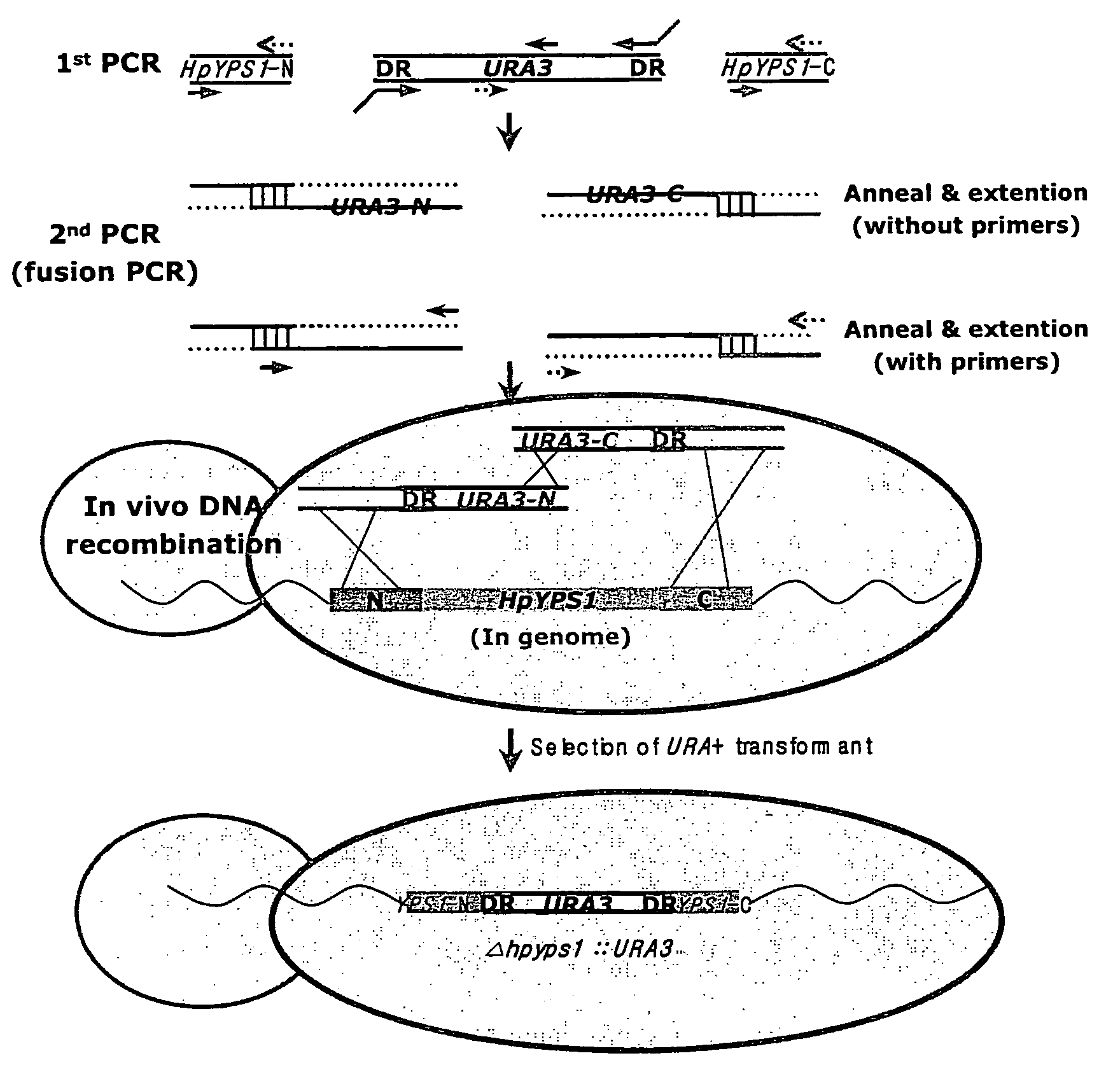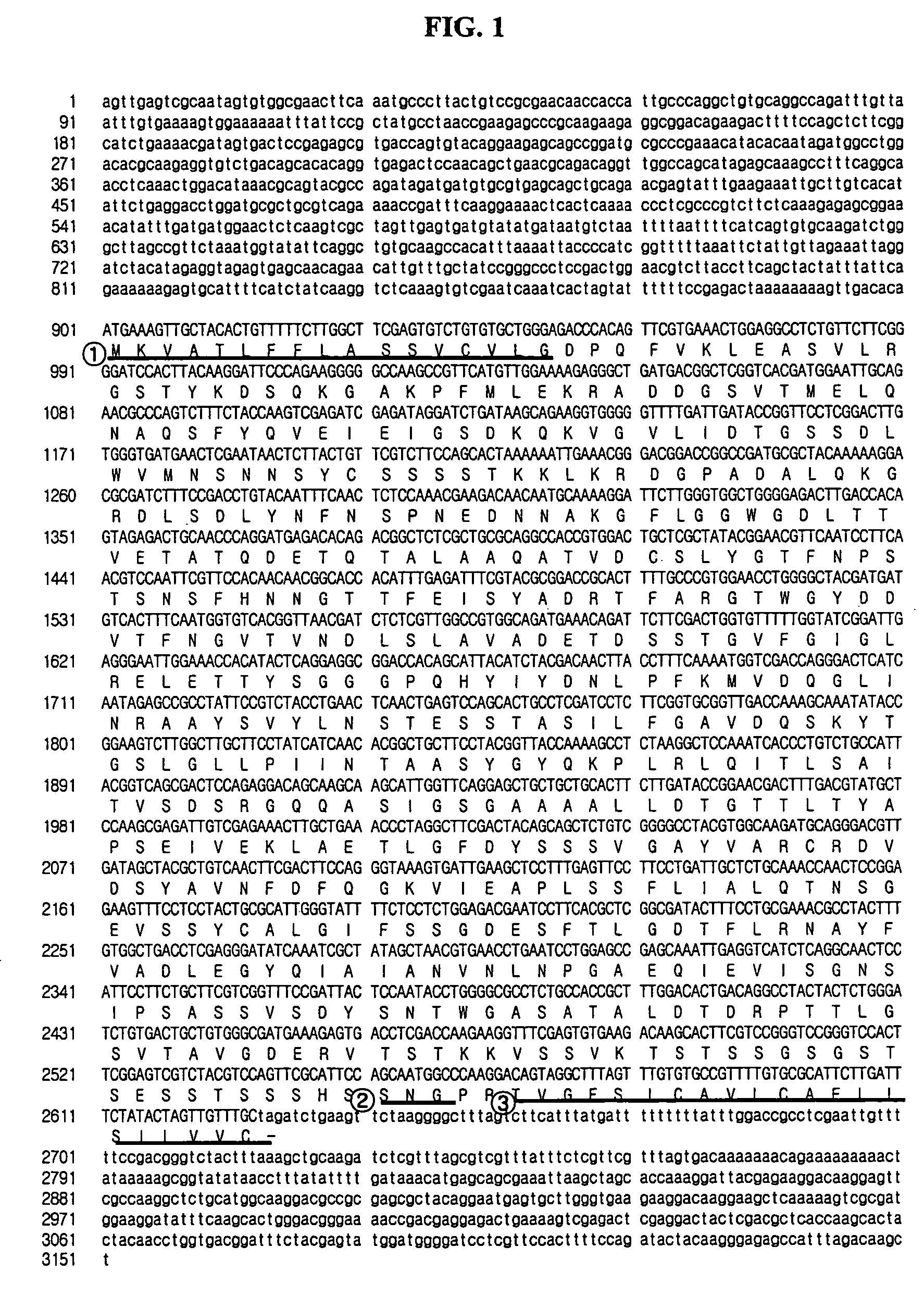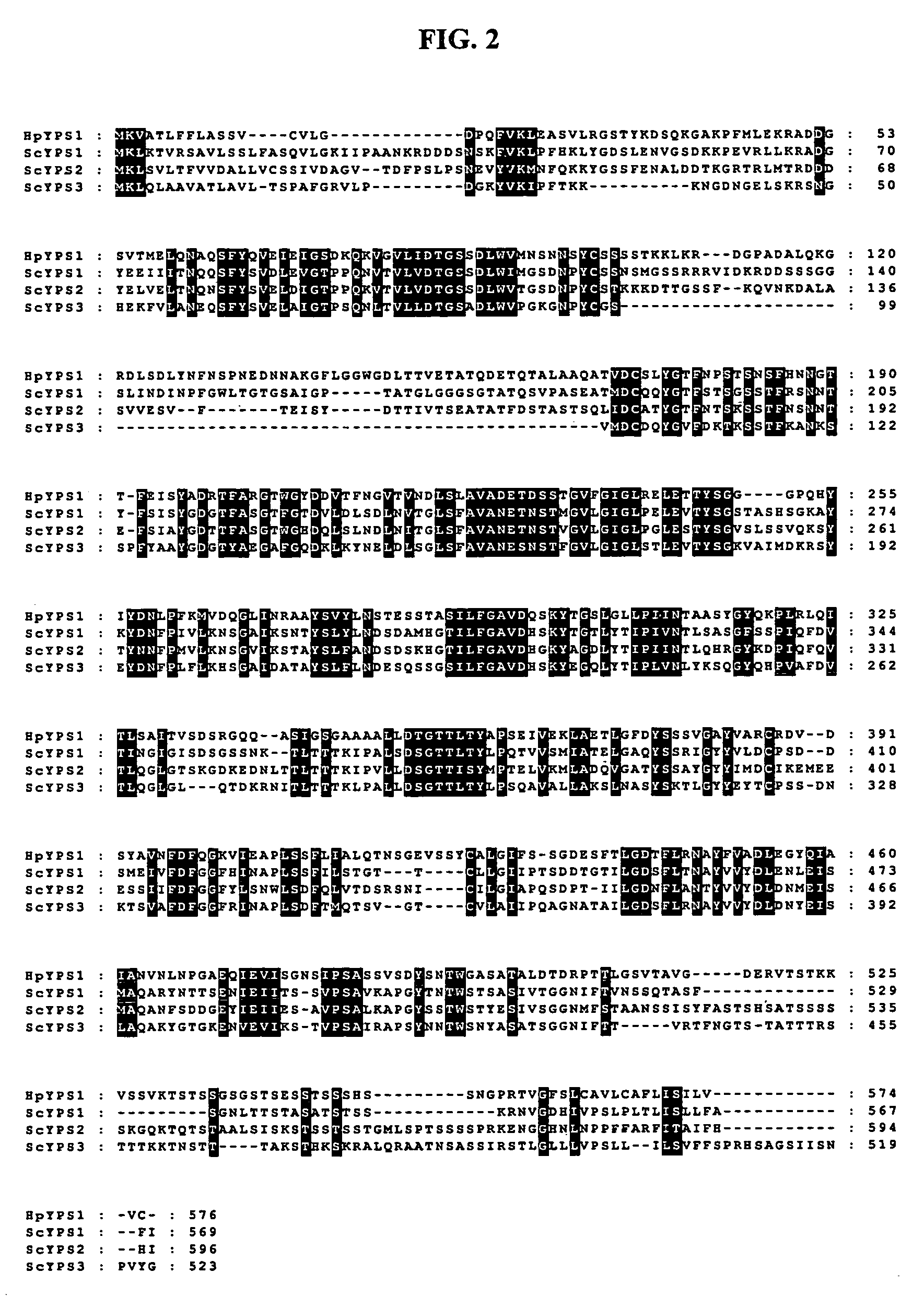Hansenula polymorpha yapsin deficient mutant strain and process for the preparation of recombinant proteins using the same
a technology of hansenula polymorpha and yapsin, which is applied in the field of hansenula polymorpha /i > yapsin deficient mutant strain and process for the preparation of recombinant proteins using the same, can solve the problems of reducing the overall productivity of recombinant proteins, and achieve high efficiency, prevent cleavage and decomposition, and high efficiency
- Summary
- Abstract
- Description
- Claims
- Application Information
AI Technical Summary
Benefits of technology
Problems solved by technology
Method used
Image
Examples
example 1
Cloning of Hansenula polymorpha yapsin1 Gene HpYPS1 and Analysis of the Sequence
[0044]In order to find a gene encoding yapsin1 in H. polymorpha, a pair of synthetic oligonucleotides (5′-GAAGTGCAGCAGCAGCTCCTGAACC-3′; SEQ ID NO: 3, 5′-GGCTGATGACGGCTCGGTCACGATGG-3′; SEQ ID NO: 4) were prepared, on the basis of information on H. polymorpha random sequenced tags described in Blandin et al., (FEBS Lett. 487, 76, (2000). By PCR (Polymerase Chain Reaction) using the prepared oligonucleotides as primers, a 0.88 kb DNA segment was amplified from H. polymorpha DL-1L derived chromosome. Then, Southern blotting was conducted using the amplified DNA segment as a probe. Based on the result of the Southern blot, 3.5 kb HindIII DNA segments was extracted from H. polymorpha chromosomal DNA to prepare a genome library, which was transformed into E. coli. A DNA segment reactive with the DNA probe was isolated by colony PCR and subjected to DNA sequencing to identify a DNA segment comprising ORF (Open R...
example 2
Functional Analysis of the Hansenula polymorpha HpYPS1 Gene
[0047]In case of the traditional yeast Saccharomyces cerevisiae, it has been reported that YPS1 / YPS2 double deficient mutant strain derived from S. cerevisiae W303 strain as a parental strain shows a such high temperature sensitivity that it cannot grow at 37° C. (Komano and Fuller, Proc. Natl. Acad. Sci. USA 7, 92, 10752-10756 (1995)). Also, SLH18(yps1Δ / yps2Δ / yps3Δ) strain (Korean Patent Registration No. 10-0386836), which is a yapsin multiple deficient mutant strain having three genes of YPS1 / YPS2 / YPS3 destroyed, prepared using Saccharomyces cerevisiae L3262 as a parental strain by the present inventors, was found to show temperature sensitivity at a high temperature. As a method for functional analysis of the Hansenula polymorpha yapsin1 gene HpYPS1, a functional complementation experiment was conducted by transforming the HpYPS1 gene into the above-described Saccharomyces cerevisiae multiple yapsin mutant strain accordin...
example 3
Preparation of the HpYPS1 Gene-Deficient Strain and Analysis of Yapsin Activity
[0049]Using the HpYPS1 gene prepared above, a H. polymorpha yapsin deficient mutant strain hpyps1Δ was synthesized and assayed for change in its protein decomposition activity by yapsin. In order to prepare a mutant strain having the deletion of the HpYPS1 gene encoding Hansenula polymorpha yapsin 1, a fusion PCR (Oldenhurg et al., Nucleic Acid Res. 25, 451, (1997)) was conducted on H. polymorpha chromosomal DNA using primers described in Table 2. The resulting DNA segment was transformed into Hansenula polymorpha DL1-LdU (leu2Δura3::lacz; Kang et al., In Hansenula polymorpha:Biology and Application (Ed. G. Gellissen), pp 124 (2002)) strain to induce in vivo homologous recombination, thereby attempting deletion of the gene. More specifically, a primary PCR was firstly conducted to obtain the N-ends, C-ends of HpYPS1 gene and URA3 gene. Then, a secondary fusion PCR was conducted to fuse the N-end and C-end...
PUM
| Property | Measurement | Unit |
|---|---|---|
| concentration | aaaaa | aaaaa |
| temperature sensitivity | aaaaa | aaaaa |
| temperature | aaaaa | aaaaa |
Abstract
Description
Claims
Application Information
 Login to View More
Login to View More - R&D
- Intellectual Property
- Life Sciences
- Materials
- Tech Scout
- Unparalleled Data Quality
- Higher Quality Content
- 60% Fewer Hallucinations
Browse by: Latest US Patents, China's latest patents, Technical Efficacy Thesaurus, Application Domain, Technology Topic, Popular Technical Reports.
© 2025 PatSnap. All rights reserved.Legal|Privacy policy|Modern Slavery Act Transparency Statement|Sitemap|About US| Contact US: help@patsnap.com



